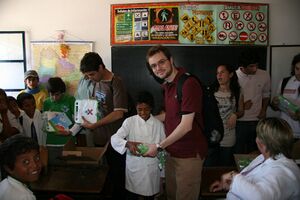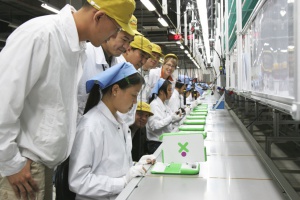The OLPC Wiki
| english | عربي | پښتو | български | deutsch | español | français | kreyòl ayisyen | italiano | 日本語 | 한국어 | монгол | Bahasa Melayu | नेपाली | norsk | português | română | русский | kinyarwanda | türkçe | 中文 | 繁體中文 | HowTo [ID# 87169] +/- |
Welcome to the OLPC Wiki, a collaborative site about the One Laptop per Child project and related communities. We currently have 9,909 pages; please join us and share your ideas. For a project overview, see also www.laptop.org.
See our help and FAQ pages
What's new
Oh Canada... We at OLPC are very sorry about the Canadian shipment situation: we underestimated the time it would take us to fully work out the import duties and taxes and we were not clear in our communication to you. We apologize for everyone with a child who will not receive a laptop this year. You can visit the laptopgiving.org website to download a gift card that lets your child know that an XO laptop is on its way; it is obviously not the same as a laptop, but we hope it helps in some small way. We are working on the logistics of getting XOs to Canada: everyone should have their XO in the January/February time frame. The team at OLPC wants to thank everyone who has thus far participated in Give One Get One. Thanks to the generosity of Canadians, more than 4000 children in the least-developed countries will be receiving laptops in early 2008. --Walter 20:39, 20 December 2007 (EST)
Weekly updates: Current events · Archives: Old News.
- We've only just begun. Uruguay has started the first mass-production deployment of OLPC! (See Ivan Krstić's blog for more details.) Next stop: Peru.
- The XO is now available through the Give One Get One program, currently extended through December 31.
- T-Mobile USA Partners with One Laptop per Child To Help Children. (Free WiFi hotspot access to Give One Get One participants).
About One Laptop per Child
- It's an education project, not a laptop project.
This is the wiki for the non-profit One Laptop per Child association. The mission of this association is to develop a low-cost laptop—the "$100 Laptop"—to revolutionize how we educate the world's children. Our goal is to provide children around the world with new opportunities to explore, experiment, and express themselves.
Why do children in developing nations need laptops? Laptops are a window and a tool: a window into the world and a tool with which to think. They are a wonderful way for all children to learn learning through independent interaction and exploration.
OLPC espouses five core principles: (1) child ownership; (2) low ages; (3) saturation; (4) connection; and (5) free and open source.
see also: more about the Laptop and OLPC's vision for learning.
Want to know more? Perhaps get involved?
A good place to start is the One Laptop per Child page, which gives an overview of the project. There is a list of frequently asked questions (FAQ); a place to ask a question; places to get involved, participate and current job openings; We can use some extra help translating and preparing content bundles in general, for example. There are numerous pages on hardware, software, content, and the developers program—and a separate wiki for software development. The XO's interface, Sugar, has its own interface guidelines. There are also discussion pages on issues of deployment and country-specific discussions. An extended table of contents is also available.
If you want to try out the laptop, you can emulate the XO on your PC. Better yet: you can support us by getting the real deal with Give 1 Get 1.
OLPC is also carefully filling some full-time positions.
About this wiki
The purpose of this wiki is to both share information about the project and to solicit ideas and feedback. The articles and discussion vary from technical to epistemological. We invite comments on every page (please use the "discussion" tab at the top of each page). Please restrict edits to the article pages themselves to facts, not opinions. You are encouraged to sign your work and to make liberal use of citations and links. (Please make an account and please use ~~~~ as a signature for your comments.) Please note that pages that include the {{OLPC}} template—such as this one—are maintained by the OLPC team and are generally representative of the current state of the project. Other pages—created and maintained by the public—should be read with that in mind.



